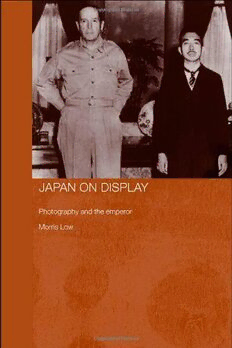
Japan on Display: Photography and the Emperor PDF
214 Pages·2006·2.953 MB·English
Most books are stored in the elastic cloud where traffic is expensive. For this reason, we have a limit on daily download.
Preview Japan on Display: Photography and the Emperor
Description:
Sixty years on from the end of the Pacific War, Japan on Display examines representations of the Meiji emperor, Mutsuhito (1852-1912) and his grandson the Showa emperor, Hirohito who was regarded as a symbol of the nation, in both war and peacetime. Much of this representation was aided by the phenomenon of photography. The introduction and development of photography in the nineteenth century coincided with the need to make Hirohito’s grandfather, the young Meiji Emperor, more visible. Photo books and albums became a popular format for presenting seemingly objective images of the monarch, reminding the Japanese of their proximity to the Emperor, and the imperial family. In the twentieth century, these 'national albums’ provided a visual record of wars fought in the name of the Emperor, while also documenting the reconstruction of Tokyo, scientific expeditions, and imperial tours. Drawing on archival documents, photographs, and sources in both Japanese and English, this book throws new light on the history of twentieth-century Japan and the central role of Hirohito. With Japan’s defeat in the Pacific War, the Emperor was transformed from wartime leader to peace-loving scientist. Japan on Display seeks to understand this reinvention of a more 'human’ Emperor and the role that photography played in the process.
See more
The list of books you might like
Most books are stored in the elastic cloud where traffic is expensive. For this reason, we have a limit on daily download.
